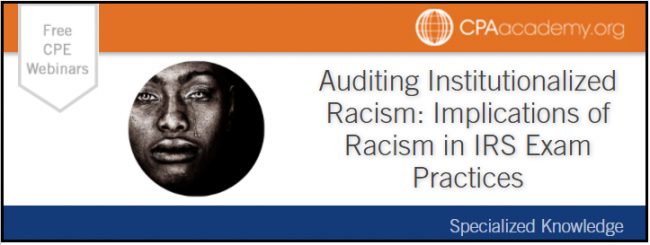Webinar-Auditing Institutionalized Racism: Implications of Racism in IRS Exam Practices

Auditing Institutionalized Racism: Implications of Racism in IRS Exam Practices
October 2, 2020
7:00 - 8:00 a.m.
Course Description
The top ten counties for the highest income tax audit rates in the United States are in communities where the average population of people of color is 80 percent. The ten counties for the lowest income tax audit rates in the United States are in communities where the average population of white residents is 90 percent. While audit selection is “colorblind” the impact is patently racist.
Moreover, the selection is antithetically classist as well. All of the top ten communities are in poverty-stricken neighborhoods in Mississippi, Alabama or Louisiana. These disproportionate audit rates result from the high rate of participation in the Earned Income Tax Credit (EITC) in these communities coupled with the high audit rate of the EITC. Given the significant short-term and long-term health, education, and well-being benefits families and their communities enjoy from the EITC and the demonstrated adverse health and well-being consequences of being audited and denied the EITC, the intersection of these two factors not only exacerbate income and wealth inequality but perpetuate the cycle of poverty. This is the exact opposite of the purported goal of the EITC that is to encourage work and lift families out of poverty. Nevertheless, communities of color are suffering this double-edged sword with little relief or resources.
This presentation builds on existing EITC scholarship including countless studies demonstrating the broad-based EITC benefits for families, including but not limited to increased work rates, decreased smoking, increased birth weight, higher test scores, better job attainment, and higher household income etc., etc. Recent scholarship has monetized the adverse impact of EITC audits and benefit denials on families, including the 80% of whom may qualify for EITC benefits. These adverse consequences include reduced future tax filings, tax refunds and employment. Consistent with Professor Eubanks’ recent book “Automating Inequality: How High-Tech Tools Profile, Police, and Punish the Poor” Professor Lipman explains how automated EITC correspondence audits are discriminatory even though they are “colorblind.” Given the significant economic hardships and inherent racism of the current system, something must be done. The first step to resolving systems of injustice is shining a bright light of truth on the problem. This panel achieves this goal.
This webinar will cover:
- IRS Audit Data
- Audit Distributions
- Top 10 Audited Zip Codes
- Bottom 10 Audited Zip Codes
- EITC Audits
- EITC Correspondence Audits
- Post EITC Audit Behavior
- EITC Data
- Solutions
Presenter
Frequently Asked Questions
- To receive CPE credit for the event, you must register for the webcast prior to the start of each program.
- CPE is available to all eligible participants within 24 hours of each webinar.
- Multiple attendees: In order to receive CPE for multiple attendees, ensure that at least one person signs up for the webinar. At the completion of the webinar a proctor form is provided. Alternatively, you may also login to your account following the webinar and click on the MY ACCOUNT button where you will find a link to the proctor letter.

